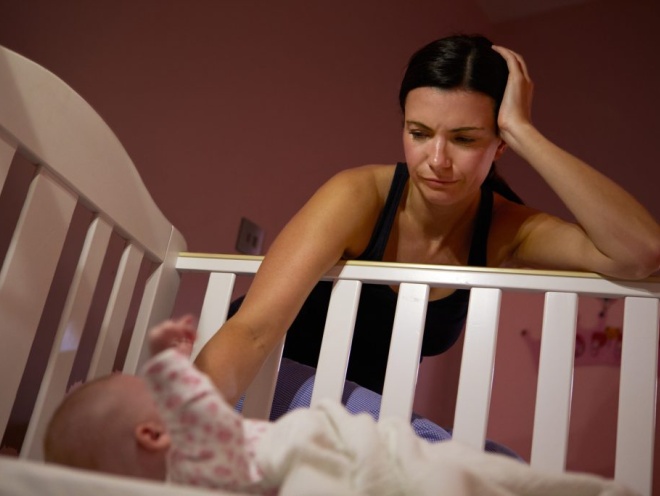You’ve arrived home with your baby and feel overjoyed but then, out of nowhere, all you can do is cry. Welcome to a very common condition... the baby blues.
What are the baby blues?
Not just an old wives’ tale, the baby blues are real, affecting up to 80% of women after they give birth (NICE, 2014). Women who experience the baby blues can expect to feel down for a little while shortly after having their baby (NHS, 2018a).
What are the symptoms of the baby blues?
If you’re going through the baby blues, you might feel:
- emotional, irrational or overwhelmed
- tearful (without knowing why)
- irritable and moody
- down or anxious.
(NHS, 2018b)
Symptoms might upset you at the time, but they are relatively mild and will usually pass within 10 to 14 days after the birth (NHS, 2018b). If they hang around, become more severe or include manic symptoms, they could be signs of more serious postnatal illness, such as postnatal psychosis. If so, you should speak to your GP or health visitor about getting some help and support (NICE, 2014).
If you think it might be something more serious, talk to your GP or health visitor.
What causes the baby blues?
The exact cause of the baby blues is not known, but is probably mostly down to the hormones that fall rapidly after birth (Puryear, 2014; Rezaie-Keikhaie et al, 2020).
Lack of sleep and newborn babies go hand in hand, and this is thought to be another factor for the baby blues (Ross et al, 2005).
There’s also the huge weight of responsibility that comes with bringing a human into the world. Much as you love your child, it’s ok to admit that when you first get home, having a baby can feel seriously overwhelming (MIND, 2020).
How can I reduce the impact of the baby blues?
The good news is that for most women, the symptoms will pass in a few days. In those early days, you can stay tucked up with your baby as much as possible, and feed them very frequently.
In recent years health professionals have started asking you to go to hospital for routine checks, rather than visiting you at home. Consider whether that meets your need to get to know your baby and recover from the birth, and request a home visit if not.
You could ask your family to pop over and help out around the house or chat to a friend about how you’re feeling. On the other hand, if it’s all getting a bit too much, you could simply ban the visitors for a few days.
Yet if your symptoms don’t ease, become severe or you have thoughts of harming yourself or your baby, speak to your midwife, GP, health visitor or emergency healthcare urgently.
This page was last reviewed in January 2022
Further information
Our support line offers practical and emotional support with feeding your baby: 0300 330 0700. We also offer antenatal courses which are a great way to find out more about birth, labour and life with a new baby.
Make friends with other parents-to-be and new parents in your local area for support and friendship by seeing what NCT activities are happening nearby.
MIND. (2020) Understanding postnatal depression and perinatal mental health. Available at: https://www.mind.org.uk/information-support/types-of-mental-health-prob… [Accessed 14th January 2022].
NHS. (2018a) Overview - postnatal depression. Available at: https://www.nhs.uk/conditions/post-natal-depression/ [Accessed 14th January 2022].
NHS. (2018b) Feeling depressed after childbirth. Available at: https://www.nhs.uk/conditions/pregnancy-and-baby/feeling-depressed-after-birth/ [Accessed 14th January 2022].
NICE. (2014) Antenatal and postnatal mental health. Clinical management and service guidance CG192. Available at: https://www.nice.org.uk/guidance/cg192 [Accessed 14th January 2022].
Puryear LJ. (2014) Postpartum adjustment: what is normal and what is not. In: Barnes DL. (ed) Women's Reproductive Mental Health Across the Lifespan. Switzerland, Springer: 109-122.
Rezaie-Keikhaie K, Arbabshastan ME, Rafiemanesh H, Amirshahi M, Ostadkelayeh SM, Arbabisarjou A. (2020) Systematic review and meta-analysis of the prevalence of the maternity blues in the postpartum period. J Obstet Gynecol Neonatal Nurs. 49(2):127-136. Available at: https://pubmed.ncbi.nlm.nih.gov/32035973/ [Accessed 14th January 2022].
Ross LE, Murray BJ, Steiner M. (2005) Sleep and perinatal mood disorders: a critical review. J Psychiatry Neurosci. 30(4):247-256. Available at: https://www.ncbi.nlm.nih.gov/pmc/articles/PMC1160560/ [Accessed 14th January 2022].







